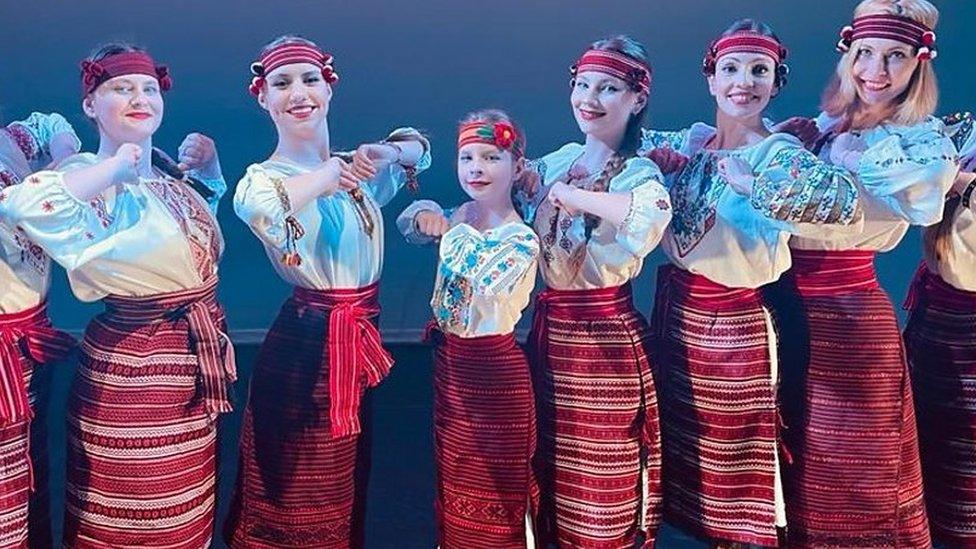How community in Kinver has rallied for Ukrainian family
- Published
'I have no idea how long we'll be here'
It's mid-July and the sun's beating down on an already scorched school field as parents settle into their camping chairs.
Across the freshly-painted running track, Anfisa and Igor are among dozens of children about to experience their first British school sports day.
Near the finish line, I caught up with their proud mother Diana Ruda who's full of excitement.
"I can't believe we are here," she said. "This is exciting, the children seem so happy."
Four months earlier, in March, the family-of-five made their "toughest decision", packing essential clothes into rucksacks to leave their home in Chernivtsi, western Ukraine.
Diana, her husband Oleg and their children eight-year-old Anfisa, 10-year-old Oleg and Igor, six, crossed the border into Poland after weeks of living in and out of bomb shelters.
The anxiety was crippling them, draining them of hope.
Speaking to me through an interpreter, the 31-year-old mother said: "The Russians didn't get as far as our home town, but the sirens were sounding every day.
"I was afraid for my family. My children were scared or crying. My eldest son said he was afraid and didn't want to be there."
They abandoned their family car after crossing into Poland and hitched a ride to the airport.
The family flew to the UK with huge uncertainty and very few possessions. Oleg's father, who lives in Staffordshire, was able to offer them a bedroom but it was too small for a family of five.
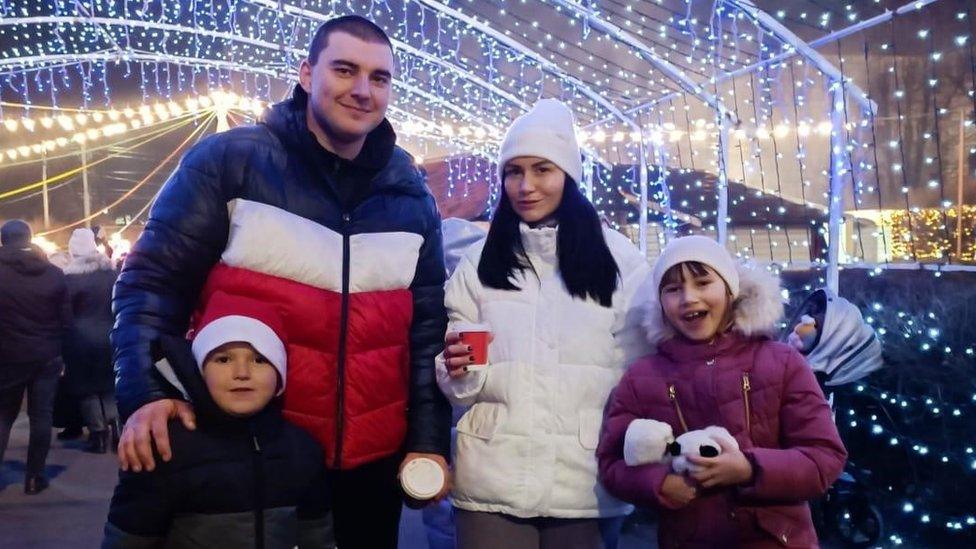
They are now renting a house in Kinver
Then Emma Quigley, a mother-of-three from Kinver, got in touch with them to offer to host them until they could find something more permanent.
"To see their faces was just incredible - I wouldn't be human if I hadn't helped them, would I?," Ms Quigley told me.
The Rudyi family have now been granted a visa by the government and can stay in the UK for up to three years.
They are now renting a house in Kinver and can afford the payments thanks to housing benefits and some income from Oleg's part-time job.
"In Ukraine, my husband was a long distance lorry driver but here in England he is unable to carry on in this profession because his documentation isn't recognised," Diana, whose family run a clothing business in Ukraine, said.
"Unfettered joy"
"He's been looking into retraining here but the course is so expensive. He's trying to save but we know it will take some time."
Over the past two months, I've been dropping in to catch up with Diana and her family.
On each occasion, their grasp of English has improved and their love of Kinver has grown. The community have reached out with food and school uniform donations - it's a cliché, but they really have welcomed them with open arms.
At Brindley Heath Academy, they were oversubscribed in the year group that 10-year-old Oleg was applying for.
But head teacher Jimmy Martin told me they knew what they had to do.
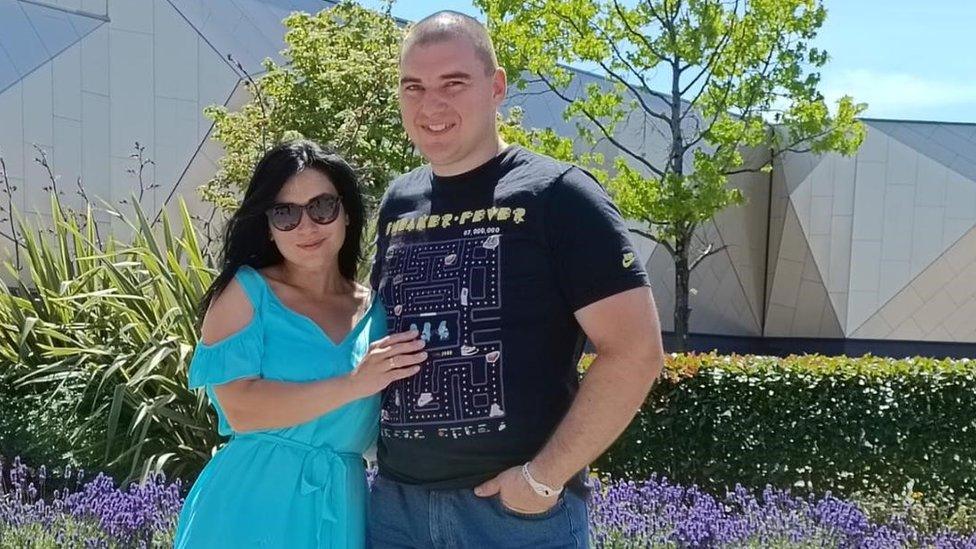
"Local people have been wonderful and very welcoming, but I still miss Ukraine," Diana said
"Actually, it's a little boy who has suffered and gone through a really traumatic experience," Mr Martin said.
"What does that matter compared to teacher workload? There was this magical moment when the children saw Anfisa and Oleg running out on to the field, they just ran out and played.
"There was that real unfettered joy that came through and we knew it was the right thing to do."
Schools in the Manor Multi Academy Trust say welcoming the family has opened up child-focused conversations about war and its impact on families.
I was shown a storeroom where pupils have collected hundreds of soft toys to send to refugee camps on the Ukraine/Poland border.
One blue teddy bear carried a personal message from a pupil: "I hope my message can bring joy to you: and I wish things can get better," it read.
At Foley Infant Academy nearby, I joined Igor as his class enjoyed a "forest school" experience, making animals out of clay.
There had been a clamour to be his classroom buddy, according to head of school Gemma Fox.
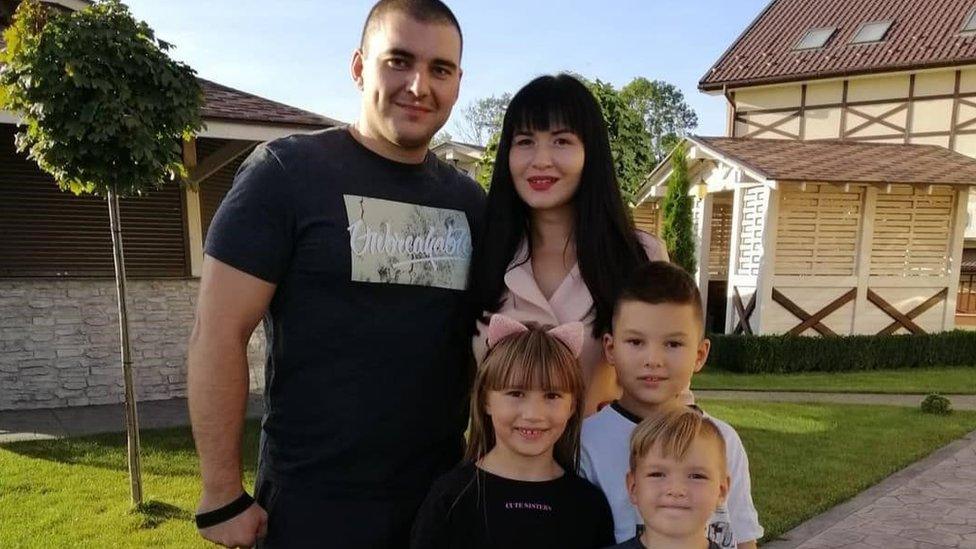
The family did not know if their town would be targeted by Russia
"It's been wonderful to see the relationships and the empathy children have for him. Igor has had 'survival cards' so he can let us know if he's happy, sad or needs the toilet, but he is communicating well," she said.
"We have tailored our curriculum for arts and music, lessons we know he can access with ease and phonics - he's picking up phonics sounds already. He's been praised in an assembly for resilience."
That word - resilience - almost doesn't need reiterating here.
As I sat in Diana's new garden at her home, she fought back tears when I asked her what her family's future looks like.
"Life was good, but no-one knew if or when our town would be targeted," she said.
"Local people have been wonderful and very welcoming, but I still miss Ukraine, it's my homeland, my country.
"When the war finishes, I would like to return home, but my children may have already settled here so I don't know.
"All I know is a mother's love will endeavour to keep her children safe".
Watch the story in full on BBC Midlands Today on 20 July at 18:30 BST.

Follow BBC West Midlands on Facebook, external, Twitter, external and Instagram, external. Send your story ideas to: newsonline.westmidlands@bbc.co.uk, external
Related topics
- Published19 July 2022
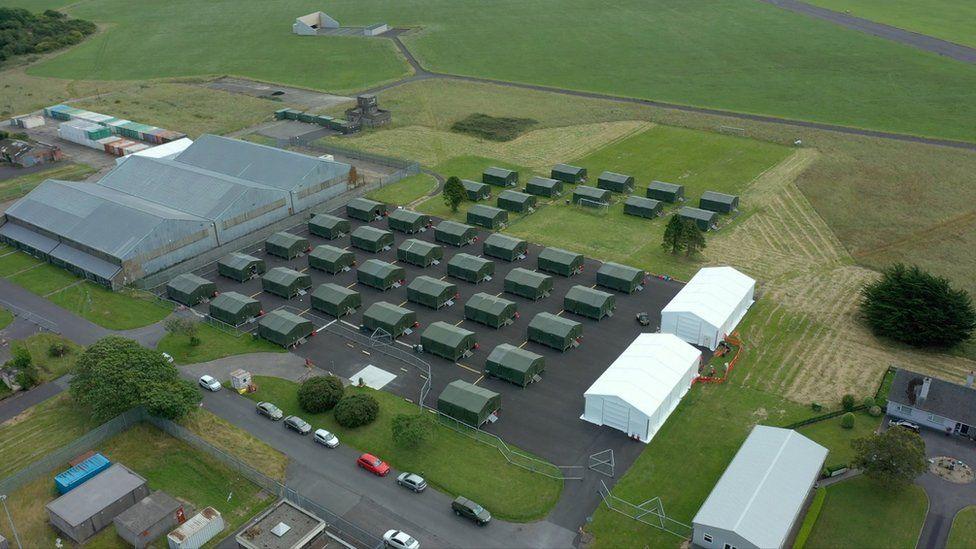
- Published18 July 2022
